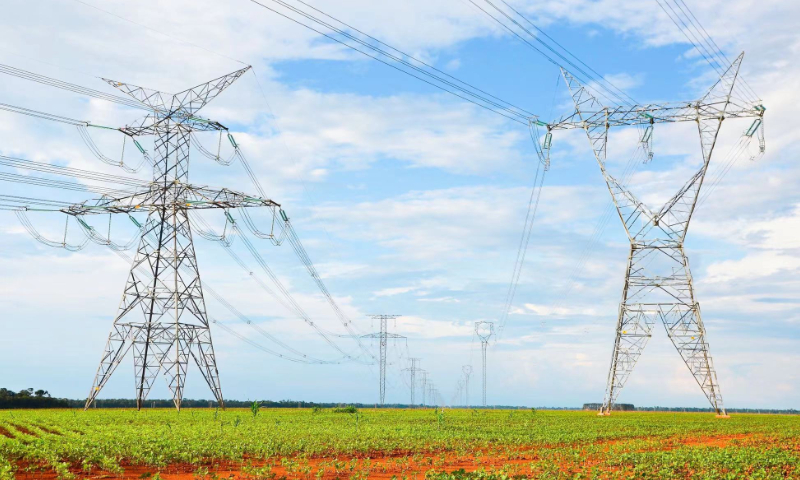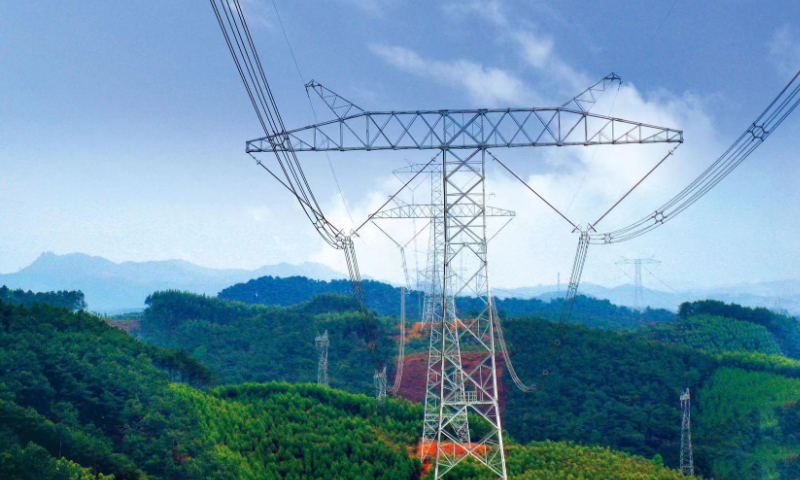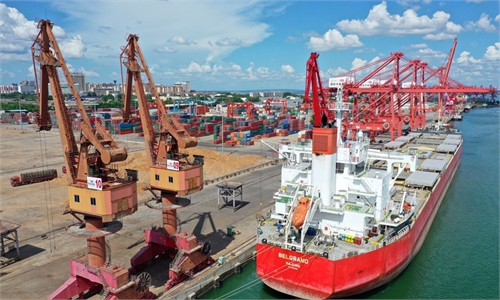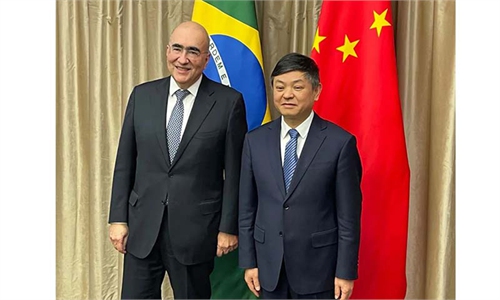China-Brazil economic and trade ties see deeper and wider potential for growth under BRICS ahead of presidential visit

Chinese company-participated Belo Monte ultra-high-voltage power transmission project in Brazil Photo: Courtesy of PowerChina
Brazilian President Luiz Inacio Lula da Silva will pay a state visit to China from March 26 to 31 upon invitation, Foreign Ministry spokesperson Hua Chunying announced last Friday, which will be Lula's fifth visit to China, marking an upward trend of bilateral relations.
The visit, which is widely anticipated among experts and company representatives, is considered to be a milestone in pushing bilateral economic and trade relations to a new level and unleashing greater potential for regional cooperation under various joint multi-level frameworks including BRICS, a pillar of emerging markets including Brazil, Russia, India, China, and South Africa.
The Belt and Road Initiative (BRI) which has played an increasingly important role in boosting regional and global economic and trade development is also a notable mechanism, experts said.
A senior official from the Brazilian Ministry of Foreign Affairs recently stated to the media that the Brazilian president will lead a delegation of 240 business representatives in his visit to China this month, including 90 representatives from the agricultural sector, as the country hopes to develop diversified trade relations with China, according to media reports.
The magnitude of such a business delegation is historic and could be taken as an indication of more deals to be discussed in diverse fields of cooperation, not just in trade but also investment and other areas where the two countries are highly complementary and are mutually beneficial, experts said.
Since the establishment of diplomatic relations between China and Brazil, bilateral economic and trade relations have made great progress, with China remaining Brazil's largest trading partner for 14 consecutive years.
Despite global challenges such as high inflation, geopolitical conflicts, the COVID-19 pandemic, and other factors, bilateral trade volume reached $171.49 billion in 2022, a year-on-year increase of 4.9 percent, according to data released by China's General Administration of Customs, injecting momentum of recovery into regional and global economies and trade.
Moreover, Brazil has been China's biggest destination country for investment in Latin America for many years, with infrastructure being key. As an extension of the BRI in Latin America, the projects, funded and developed by Chinese companies, have borne fruit and driven local economic growth, created jobs, and improved local livelihoods in Brazil.
Solid foundation
Amidst the roar of the machines, the construction of multiple bidding sections of the Sao Paulo Metro Line 2 is now in full swing.
Under joint development by the Power Construction Corp of China (PowerChina) and local companies in Brazil, the project is one of many examples of the solid foundations built in line with closer bilateral ties.
The project has not only directly created more than 1,200 local jobs and promoted regional employment and economic development, but its completion will also greatly improve regional transportation while boosting long-term regional economic development, PowerChina told the Global Times in a statement on Thursday.
In recent years, Chinese companies have been investing in a variety of signature mega projects, including the construction of Latin America's longest cable-stayed sea bridge, linking the city of Salvador and the island of Itaparica, and China Merchants Port Holdings' Paranagua Container Terminal, located on the Atlantic coast of the southern state of Parana, the second largest container terminal in Brazil, Xinhua News Agency reported.
At the same time, Chinese enterprises have actively participated in the construction of local hydropower, solar energy, wind energy, and other renewable energy projects, and explored opportunities for green economic cooperation, which will further promote diversified and high-level investment cooperation between the two countries.
The China-Brazil investment cooperation has a solid foundation. China is Brazil's main source of foreign investment, and its cumulative investment in Brazil reached nearly $100 billion as of December 2022, according to the Chinese Embassy in Brazil, putting the scale at the forefront of China's investment in developing countries.
China's investments cover a wide range of fields such as electric power, oil and gas, water affairs, logistics, and machinery.
PowerChina told the Global Times that the Brazilian president's visit to China will consolidate China's position as Brazil's most important trading partner and further deepen areas and models of cooperation while strengthening confidence in investment cooperation.
"The close relationship between the two governments will be a catalyst for bilateral economic cooperation," the company said.
While global trade is facing increasing challenges, the economic and trade cooperation between Brazil and China has continued to maintain strong momentum of development under BRICS, especially in recent years when the Brazilian economy faced challenges prompting the country's government to further strive toward recovery, Tang Jie, Latin American Affairs of Institute of American & Oceanian studies researcher at the Chinese Academy of International Trade and Economic Cooperation, Ministry of Commerce, told the Global Times on Thursday.
BRICS countries have become an important source of investment in Brazil, led by investment from China. A large amount of investment has effectively improved the level of Brazil's infrastructure and other fields such as trade, the digital economy, and green development, Tang said.
Another example of fruitful cooperation in the area of trade is the position held by Brazil as being a leading meat producer and exporter in the world while China is a major consumer and importer of many products ranging from agricultural goods such as pork and soybean to iron ore.

Chinese company-participated Belo Monte ultra-high-voltage power transmission project in Brazil Photo: Courtesy of PowerChina
New impetus
There is greater potential to be harnessed, experts and industry insiders told the Global Times, responding to the new impetus the Brazilian president's visit may inject into bilateral economic and trade cooperation, particularly under BRICS and the BRI.
In June 2022, the 14th BRICS Summit was held, during which a joint declaration was announced, paving the way for the direction of stronger partnerships between member states amid global challenges.
Within the declaration, cooperation in areas such as digital transformation, industrial and supply chain resilience and stability, and low-carbon development, was highlighted, in addition to other forms of cooperation, which Tang said would continue to be the focus of discussion regarding future cooperation during this visit.
"The large Brazilian business delegation to accompany the president will seek more investment from China as Brazil is in need of more capital, technological input, and other forms of support to back up its economic recovery," Tang said.
At the same time, China is bolstering trade and opening-up in a "dual circulation" development paradigm push, which is likely to see further potential unleashed through cooperation with Brazil, a major trading partner, the expert said, indicating the likelihood of closer trade ties.
Moreover, both sides are making efforts to transition from traditional industries to high-end and sustainable industries, with digital and green economies at the core. China is globally competitive in wind, solar energy, and new-energy vehicle (NEV) technology, areas in which experts said both sides can further cooperate.
Projects under the BRI have also played a major role in further fortifying China-Latin America ties including in countries like Brazil, which experts said would be a future highlight.
"Although Brazil has not yet formally joined the BRI, the extension of the initiative in Latin America has already benefited Brazil," Tang said.
There are 21 Latin American and Caribbean signatories to the BRI, CCTV News reported in January.
Wang Youming, senior research fellow and director at the Department for Developing Countries Studies, the China Institute of International Studies, told the Global Times that experts and insiders expect the country to finally sign onto the BRI.
"The signing of the agreement will further promote a series of priority cooperation plans and follow-up actions in key areas of cooperation, while further leveraging its potential in the economic and trade fields between the two countries," Wang said.



